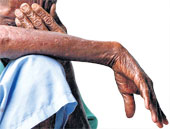 |
Social stigma and discrimination against people living with HIV/AIDS (PLHA) is all too common. But the problem is doubly shocking when patients face discrimination from hospitals and the medical services.
Mubashir Ali (name changed on request) of Murshidabad is one such unfortunate victim of discrimination at the hands of doctors. He lived with HIV for at least a year before he was diagnosed with the disease. Then began his journey of humiliation. What hurt Ali and his family most was the attitude of health professionals. “It was as if he had committed a sin by contracting the disease. He was treated like a diseased animal in hospitals in Murshidabad,” says Munawwar, his elder brother. Mubashir, 32, was in Calcutta recently for a free dose of anti-retroviral drugs at the Carmichael Hospital of Tropical Medicine.
Cases of PLHA being turned away from hospitals come as no surprise to aid workers. They admit that as consumers of healthcare, HIV/AIDS patients often get a raw deal. While private hospitals release PLHA without directly citing HIV/AIDS as the reason, government hospitals also find ways to wriggle out of treating them.
“Doctors in private and government hospitals usually don’t say why they are not treating PLHA. More often than not, they don’t even bother to counsel the family of the patient. What they do tell the patient, however, is that he or she needs to go to a bigger hospital,” says Biswajit Das, secretary, Bengal Network for People Living with HIV/AIDS. Das asserts that cases of discrimination in government hospitals towards PLHA is a “recurring and acute” problem. “Since one of the forms of transmission of the disease is sexual, young men and women are the target of ridicule in hospitals,” says Das.
So what redress do PLHA have if they have been refused treatment by a government or a private hospital? “The Supreme Court’s guidelines are pretty clear here,” points out Bejon Misra, executive director, Consumer Voice India. “If a patient has been refused treatment, he or she should be given a reason for the refusal of treatment in writing,” he says. If there is no valid reason for refusal of treatment then a paying patient can knock on the doors of the consumer court while others can file a case in any other court of law. “HIV/AIDS patients who are denied treatment in a hospital or face discrimination should approach the court of law, saying that their fundamental right to healthcare has been violated,” he adds.
However, since most patients with HIV/AIDs are poor, going to a court —whether consumer or otherwise — is often not a feasible option. As Malay Ganguly, general secretary, People for Better Treatment, an NGO in Calcutta, points out, “Since most patients who get mistreated in government hospitals are poor, they are left with no option but to suffer the humiliation.” Ganguly, on behalf of his organisation, will soon file a public interest litigation (PIL) in Calcutta High Court against hospitals that have turned away patients suffering from HIV/AIDS. “As consumers, patients deserve better. When the government is not doing enough to protect people who suffer, I think it’s time the courts intervened,” says Ganguly.
However, it is not as if the government is completely indifferent to the plight of poor AIDS patients who, apart from being traumatised by the disease, also have to contend with negligence and at times open hostility at hospitals. An official of the West Bengal State Aids Prevention & Control Society (WBSAPCS) says that it “seriously” pursues cases of discrimination against PLHA. “Whenever a case of discrimination is brought to our notice, we take it up with the authorities. At least hospitals are now aware that somebody is watching them,” he says.
Reducing AIDS-related Stigma and Discrimination in Indian Hospitals, a survey by the Delhi-based NGO, Population Council, in three major Delhi hospitals, reveals that PLHA are often subjected to extreme forms of discrimination. “Some doctors were concerned about the potential risk of HIV infection from these patients. They stated that since they could not refuse to treat an HIV-positive patient owing to the government’s policy, they needed to take adequate precautions such as wearing double gloves and masks,” the survey states. It also came to light that hospital administrations adopt such extreme measures as burning or disposing of linen and utensils used by HIV-positive patients.
According to the study, all cadres of healthcare workers, including doctors, nurses and ward staff, exhibited discriminatory behaviour towards HIV/AIDS patients. “I have no doubt that such practices continue in many hospitals across the country,” says Vaishali S. Mahendra, senior programme officer, Population Council.
Even young patients suffering from the disease due to blood transfusion face discrimination. “This is the worst form of discrimination because these patients contract the disease through no fault of theirs,” says D.P. Mullick of the Gana Swasthya Swadhikar Mancha, a Calcutta-based organisation that tracks medical malpractices.
Given that HIV/AIDS patients have limited avenues to seek redress in case they, as consumers of healthcare, have not been treated fairly, raising awareness among healthcare professionals is of utmost importance. A report commissioned by UNAIDS says, “There is an urgent need to extend awareness among healthcare staff concerning their legal duties and responsibilities towards patients in general, and patients with HIV/AIDS in particular.”
NGOs too could play a more proactive role here. Says Ratnabali Ray, founder of Anjali, a Calcutta-based NGO, “Governments do not look upon NGOs as meaningful partners and that is a problem. If an organisation like National AIDS Control Organisation, which has enormous resources and the NGOs that work in this field come together, much more can be done in spreading awareness and ensuring better treatment for PLHA.”










